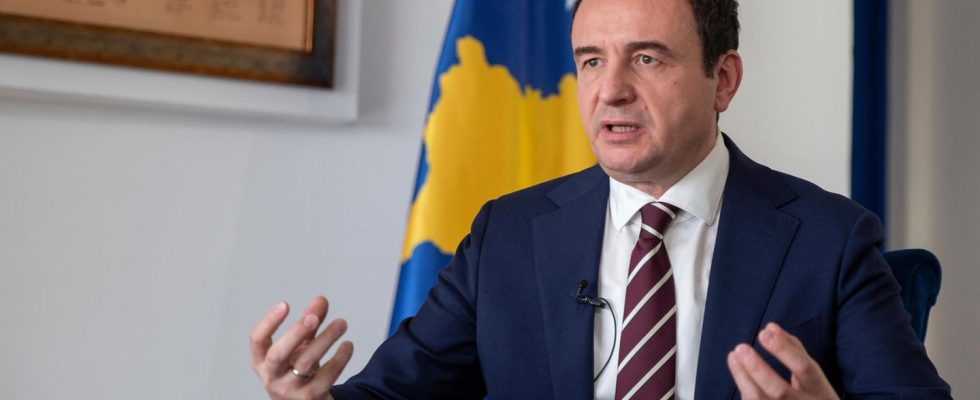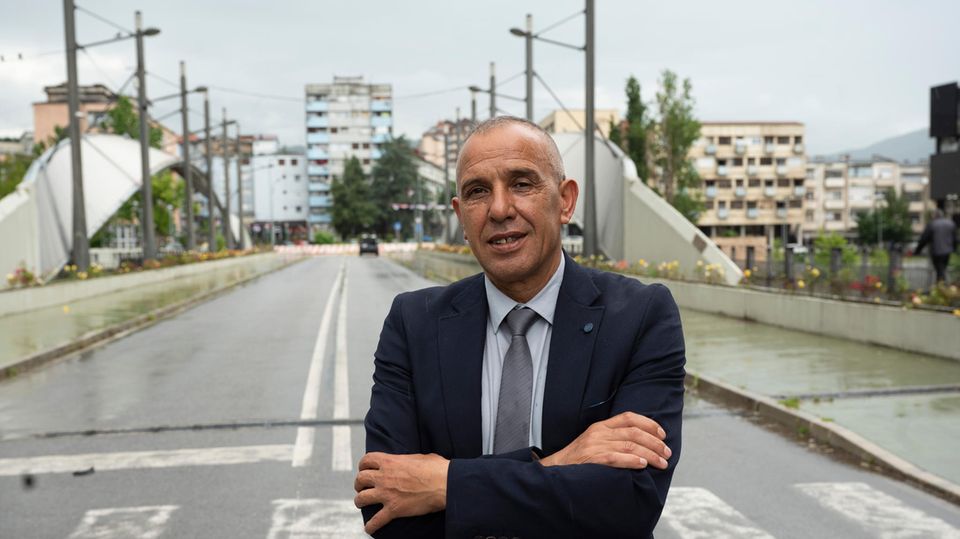Ahead of the weekend’s parliamentary elections in neighboring Serbia, Kosovo’s Prime Minister Albin Kurti is attacking Serbian President Vučić for his aggressive policies. And explains why “training” is his favorite word in the German language.
Mr Prime Minister, 15 years ago the Republic of Kosovo declared its independence from Serbia. Since then, the country has fallen somewhat out of sight for most Germans. In your opinion, what kind of country is Kosovo today?
Kosovo is a democratic, sovereign and independent country that strives to join the European Union and NATO. 117 countries worldwide have recognized us, including 22 of 27 EU members. Next year our national budget will be 35 percent higher than in 2021, when I became Prime Minister. We managed to increase tax revenue by two thirds without changing tax policy. Direct investment from abroad has doubled. And our image has improved: We have improved by 20 places in Transparency International’s “Corruption Perception Index”.
There you are now in 84th place out of 180 countries examined, i.e. slightly above the middle.
Yes, but it’s about the trend, which is clearly positive. And today we are in the best position when it comes to corruption among the countries in the Western Balkans.
This year there have been repeated reports of escalations in violence in Kosovo, most recently an attack by Serbian paramilitaries in Kosovo in September. Is another war in Kosovo possible?
We have an aggressive neighbor who doesn’t recognize us.
You mean Serbia.
Yes. All the problems we have with national security, state sovereignty and territorial integrity come from there. Our population is 93 percent Albanian, but we also have four percent Serbs and other minorities. We have positive discrimination: 20 of the 120 seats in parliament are reserved for certain minorities, but the Serbs are boycotting their seats because Belgrade tells them to do so. We support the Serbs in Kosovo in various ways: we build houses, we help start-up farmers – my Minister for Communities and Return, Nenad Rašić, a Serb, is taking care of this. But the more good we do for the Serbs in Kosovo, the more nervous and aggressive Belgrade becomes. In recent years, Belgrade has become even more nervous as approval of President Vučić’s party branch there has fallen to eight percent. At the same time, under my government we have taken very successful action against organized crime. And that made some people in the north of Kosovo very nervous because they were using the region for their own benefit. The climax was a terrorist attack on Kosovo on September 24th by paramilitaries trained by Belgrade and acting on Belgrade’s behalf. They came to stir up new conflicts. Belgrade cannot stand our country being successful.
Back then, on September 24th, masked men fought gun battles with Kosovar police officers in northern Kosovo, after blocking roads around a predominantly Serb village. Can you prove that the attack was carried out on the orders or with the knowledge of the Serbian president?
This attack was carried out by paramilitaries who received their orders directly from Belgrade. And there is only Vučić because politically Serbia is a one-man show. We also have evidence that the Serbian army gave these people the weapons. And the figure who led these paramilitaries is Milan Radoičić. We know him well; he used to be one of the leaders of organized crime. In the 1990s, when Milosevic was in power in Serbia, criminals became criminals in the name of nationalism and hatred of others. And today we see that some criminals want to become politicians. This is no longer possible in Kosovo. That’s why someone like Milan Radoičić is in Serbia today.
I’ll go back to my original question: Is a new war over Kosovo possible?
We cannot rule out an attack because it does not depend on us. But we are vigilant and have the support of our own troops and those of our NATO allies, who have increased their support since the September attack to keep our country safe. In addition, we are achieving the two percent GDP criterion for defense by investing in our military. If there is a democracy, elected leaders must bear responsibility for their actions. This leads to predictability. But a dictatorship causes danger. One does not know what Vučić will one day order his police and army to do. We can constantly feel Serbia’s aggressiveness: they have 48 forward military and gendarmerie bases around Kosovo – in the shape of a horseshoe.
On the other hand, President Vučić is the one you have to deal with somehow, because Kosovo’s political future in Europe depends on some kind of recognition from Serbia.
More than that: we have even had an agreement since February 27th of this year, the so-called “Ohrid Agreement”which is similar to the basic agreement that the Federal Republic of Germany and the German Democratic Republic concluded in 1972: live and let live, a de facto recognition of the other.
But is the agreement still alive after the many escalations this year?
Yes, it is alive. But every week the Serbian side is violating the agreement, especially article four: they are waging an aggressive campaign against Kosovo’s inclusion in international organizations. In addition, President Vučić did not sign the agreement: he says he did not accept it in terms of content, but only as a concept. The biggest problem is that the EU does not take action if Serbia violates the agreements.
Some say the EU is not taking action because it is currently trying hard to woo Serbia: it wants to get the country out of Russia’s zone of influence.
There is too much fear on the European side that Serbia will develop in the direction of Belarus. The development is already going completely in this direction. I remember my friends in European diplomacy telling me before the presidential and parliamentary elections in April 2022: Wait, the elections in Serbia will bring a change of course towards the West. But that didn’t happen. The majority of Western diplomats and foreign policy experts are either afraid of losing Serbia completely, or they believe that they can somehow get them on the way to the West – they just have to wait a little longer. But it doesn’t work.
Geopolitically, Vučić is in a comfortable position.
He likes to sit on four chairs at the same time.
On four chairs?
He wants money from the EU, dollars from the USA, but above all he wants Chinese investment and Russian weapons. That may be good for him, but not for the people of Serbia. This type of policy is not sustainable; it’s like drinking sea water to quench your thirst.
A new parliament will be elected in Serbia on Sunday. Do you expect any positive impetus for rapprochement between Kosovo and Serbia?
It’s just parliamentary elections, and in Serbia the president decides everything. I think Serbia has made a geopolitical decision: they will not secede from Russia. And they are so aggressive towards Kosovo because they want to prove to the Russians that they are a loyal proxy. I think it would have an effect if the EU and US really used their stick against Belgrade. If, for example, they were to reintroduce a visa requirement or freeze financial aid because Serbia is behaving like a proxy for Russia, then that would lead to changes.
At the moment the opposite seems to be happening: the USA and the EU will have their governments in the summer sanctioned: You and other government representatives can no longer make state visits to the EU and USA, funds have been frozen.
There were attacks on our police units and KFOR soldiers in April after we tried to bring mayors into their offices in northern Kosovo. However, we continue to hold meetings and work closely with the heads of state and government of the EU and the USA.
Mayors who were not elected.
Mayors who were elected, but with little legitimacy because the voter turnout in the elections was low.
Because the Serbian population did not participate.
Yes. But they had no chance to take part because Belgrade had people there who prevented it. The EU and US thought the reason for the violence was our attempt to get the mayors there. One of my European friends said to me: You are responsible for the outbreak of violence. But there are no volcanoes in our north. There are agents, names and structures behind outbreaks of violence. We made this public in June, and after the paramilitary attack at the end of September it became obvious to everyone. But there is a certain reluctance to withdraw the measures – as they are officially called – against us. Ironically, my Serbian minister Nenad Rašić was the first to be affected by these sanctions: in June his meeting with EU representatives in Brussels was canceled.
Will the sanctions against you be lifted soon?
I expect that. As of January 1st, Kosovo will receive visa relief from the EU. A year ago we submitted an application for EU membership – next year I hope that we will officially receive candidate status. We want to get the thousands of questions necessary from Ms. von der Leyen, and I am ready to answer them patiently. And we want to become a member of the Council of Europe in 2024 because we adhere to the fundamental principles of democracy, human rights and the rule of law.
Recently, more and more cracks have become visible in the EU: between individual states, but also in the leadership, for example between Ursula von der Leyen and Charles Michel. Is it a problem for you that Brussels does not speak with one voice?
The EU is the most important political project for peace and prosperity since the Second World War. And there will always be competition. But I hope that cooperation will prevail. Anyone who thinks they can strengthen their own state by weakening the EU is mistaken. Only the Russian Federation benefits from this.
How much percent of Kosovo’s budget actually depends on Western institutions?
Not much. However, our budget comes from people. Most of our money comes from the diaspora: There are over half a million Kosovars in Germany alone, 250,000 in Switzerland, 20 percent of our GDP are remittances from our diaspora. Incidentally, this is another point why Germany is so important for our future. Some of our best professors and students are with you today, but we want to turn the brain drain into a brain gain, that is, to bring people back. That is why we have a Ministry of Foreign Affairs and Diaspora. By the way, I also learned the word “training” from our diaspora – it is now my favorite word in German.


